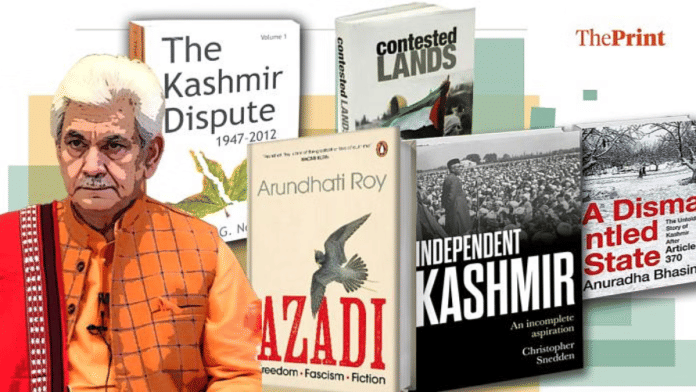New Delhi: A former Air Vice Marshal, the grandnephew of freedom fighter Subhash Chandra Bose, a former Chief Information Commissioner (CIC) and a prominent interlocutor for Jammu and Kashmir have approached the Jammu & Kashmir and Ladakh High Court seeking to set aside the Union Territory’s home department order banning 25 book titles for “promoting secessionism” and “inciting violence against the Indian state”.
On Tuesday, advocate Vrinda Grover mentioned the application before the J&K and Ladakh HC chief justice’s bench and sought its urgent listing. Since the application has been moved under section 99(2) of the Bharatiya Nagarik Suraksha Sanhita (BNSS), the Chief Justice said he will look into the papers and then order the constitution of a special bench of three judges to hear the matter.
Section 99 of BNSS outlines the procedure that has to be followed to set aside declaration of a forfeiture. Under sub-section 2, every such application shall be heard by a HC bench comprising three or more judges.
The J&K home secretary’s 5 August order to ban and forfeit the 25 book titles was issued under section 98 of BNSS that empowers the State to declare certain publications forfeited and to issue search warrants for the same.
The plea against the J&K administration’s order has been filed by former Air Vice Marshal Kapil Kak, academician and Netaji Subhash Chandra Bose’s grandnephew Sumantra Bose, independent researcher and interlocutor for J&K Radha Kumar and former chief information commissioner and J&K cadre IAS officer Wajahat Habibullah. It has questioned the basis of the notification, while defending the books that pertain largely to the sociopolitico life of Kashmir.
Besides, the books are works of academia, serving as records in the discipline of history, they have said in the plea.
While Radha Kumar and Habibullah have authored books on Kashmir, Bose’s two books, including Kashmir at the Crossroads, is among the 25 book titles forfeited.
The application, filed within the statutory timeline of 60 days, criticised the 5 August order for not revealing the grounds or basis to arrive at the conclusion that the 25 book titles propagate false narrative and secessionism in J&K.
The order is not just a clear restriction on the fundamental right to freedom of speech and expression, but also impinges the allied “right to know”, they have argued.
It does not meet the standards of proportionality test laid down by the Supreme Court, which allows the State to resort to the “least restrictive measure” while imposing “reasonable restrictions.” Thus, the order is unconstitutional and untenable, the application said.
“It (notification) does not set out any portion(s) of the concerned books to demonstrate why the same has been determined to propagate ‘false narrative’,” they have written in the application, saying the notification does not stand out as a reasoned order as envisaged under section 98 of BNSS.
The broad statements, which reproduce or reference statutory provisions without showing how the same has been inferred in the context of the 25 books, do not meet the legal principles, said the plea, asking the authorities to explain the mode and manner in which a material is identified as creating a false narrative.
“It is settled law that an administrative or quasi-judicial order having civil consequences must disclose reasons which must form part of the order itself and the reasons cannot be supplied at a later stage,” the application submitted.
The procedural safeguard in BNSS requires reasons to be incorporated in the ban order and cannot be “short-circuited by administrative verbosity masquerading as reasons”, they said.
The failure to identify and incorporate the content of the book in the notification is a “fatal illegality” and this is not curable at this stage, the application said.
The notification does not elucidate the grounds for forming the opinion that led to the forfeiture of books, the application said. While distinguishing between the opinion of the government and the grounds for forming the opinion, the application said the notification should have underlined the material that drove the authority to order the ban and forfeiture.
(Edited by Ajeet Tiwari)
Also Read: Why J&K HC set aside relief granted in UAPA case to 2 Kashmiris who chanted anti-national slogans






